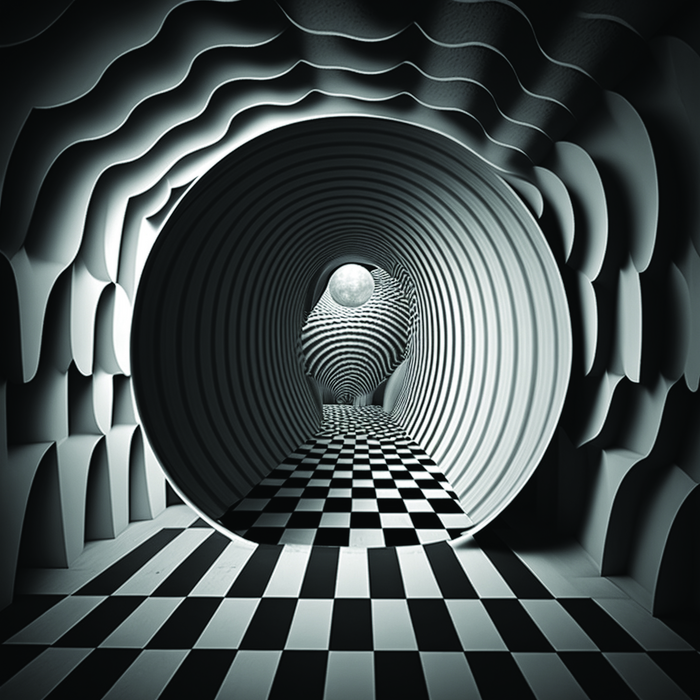Dreams are being turned into reality as new research investigating the unusual experiences of people with depersonalisation symptoms is being brought to life in an art exhibition at Anglia Ruskin University (ARU) in Cambridge, England.

Credit: Jewel Chang, Anglia Ruskin University
Dreams are being turned into reality as new research investigating the unusual experiences of people with depersonalisation symptoms is being brought to life in an art exhibition at Anglia Ruskin University (ARU) in Cambridge, England.
ARU neuroscientist Dr Jane Aspell has led a major international study into depersonalisation, funded by the Bial Foundation. The “Living in a Dream” project, results from which will be published later this year, found that people who experience depersonalisation symptoms sometimes experience life from a very different perspective, both while awake and while dreaming.
Those experiencing depersonalisation often report feeling as though they are not real and that their body does not belong to them. Dr Aspell’s study, which is the first to examine how people with this disorder experience dreams, collected almost 1,000 dream reports from participants.
Now these dreams have been recreated by eight students from ARU’s MA Illustration course and the artwork will go on display for the first time on 31 March and 1 April as part of the Cambridge Festival.
This collaboration between art and science, led by psychologist Matt Gwyther and illustrator Dr Nanette Hoogslag, with the support of artist and creative technologist Emily Godden, has resulted in 12 original artworks, which have been created using the latest audio-visual technologies, including artificial intelligence (AI), and are presented using a mix of audio-visual installation, virtual reality (VR) experiences, and traditional media.
Dr Jane Aspell, Associate Professor of Cognitive Neuroscience at ARU and Head of the Self and Body Lab, said: “People who experience depersonalisation sometimes feel detached from their self and body, and a common complaint is that it’s like they are watching their own life as a film.
“Because their waking reality is so different, myself and my international collaborators – Dr Anna Ciaunica, Professor Bigna Lenggenhager and Dr Jennifer Windt – were keen to investigate how they experience their dreams.
“People who took part in the study completed daily ‘dream diaries’, and it is fabulous to see how these dreams have been recreated by this group of incredibly talented artists.”
Matt Gwyther added: “Dreams are both incredibly visual and surreal, and you lose so much when attempting to put them into words. By bringing them to life as art, it has not only produced fabulous artwork, but it also helps us as scientists better understand the experiences of our research participants.”
Amongst the artists contributing to the exhibition is MA student Jewel Chang, who has recreated a dream about being chased. When the person woke up, they continued to experience it and were unsure whether they were experiencing the dream or reality.
False awakenings and multiple layers of dreams can be confusing, affecting our perception of time and space. Jewel used AI to create an environment with depth and endless moving patterns that makes the visitor feel trapped in their dream, unable to escape.
Kelsey Wu, meanwhile, used special 3D software and cameras to recreate a dream of floating over hills and forests, and losing balance. The immersive piece, with the audience invited to sit on a grass-covered floor, creates a sense of loss of control of the body, which moves in an abnormal and unbalanced way, and evokes a struggle between illusion and reality as the landscape continuously moves.
Dr Nanette Hoogslag, Course Leader for the MA in Illustration at ARU, said: “This project has been a unique challenge, where students not only applied themselves in supporting scientific research, but investigated and used a range of new technologies, including virtual reality and AI-generated imagery. The final pieces are absolutely remarkable, and also slightly unsettling!”
The immersive exhibition, which is free to attend, is being held at ARU’s campus on East Road in Cambridge on 31 March and 1 April. For further details, visit https://aru.ac.uk/community-engagement/cambridge-festival/living-in-a-dream-a-visual-exploration-of-the-self-in-dreams-using-ai-technology
ARU is hosting a variety of talks and events during this year’s Cambridge Festival. Details of all these sessions can be found at https://aru.ac.uk/community-engagement/cambridge-festival
Ends



